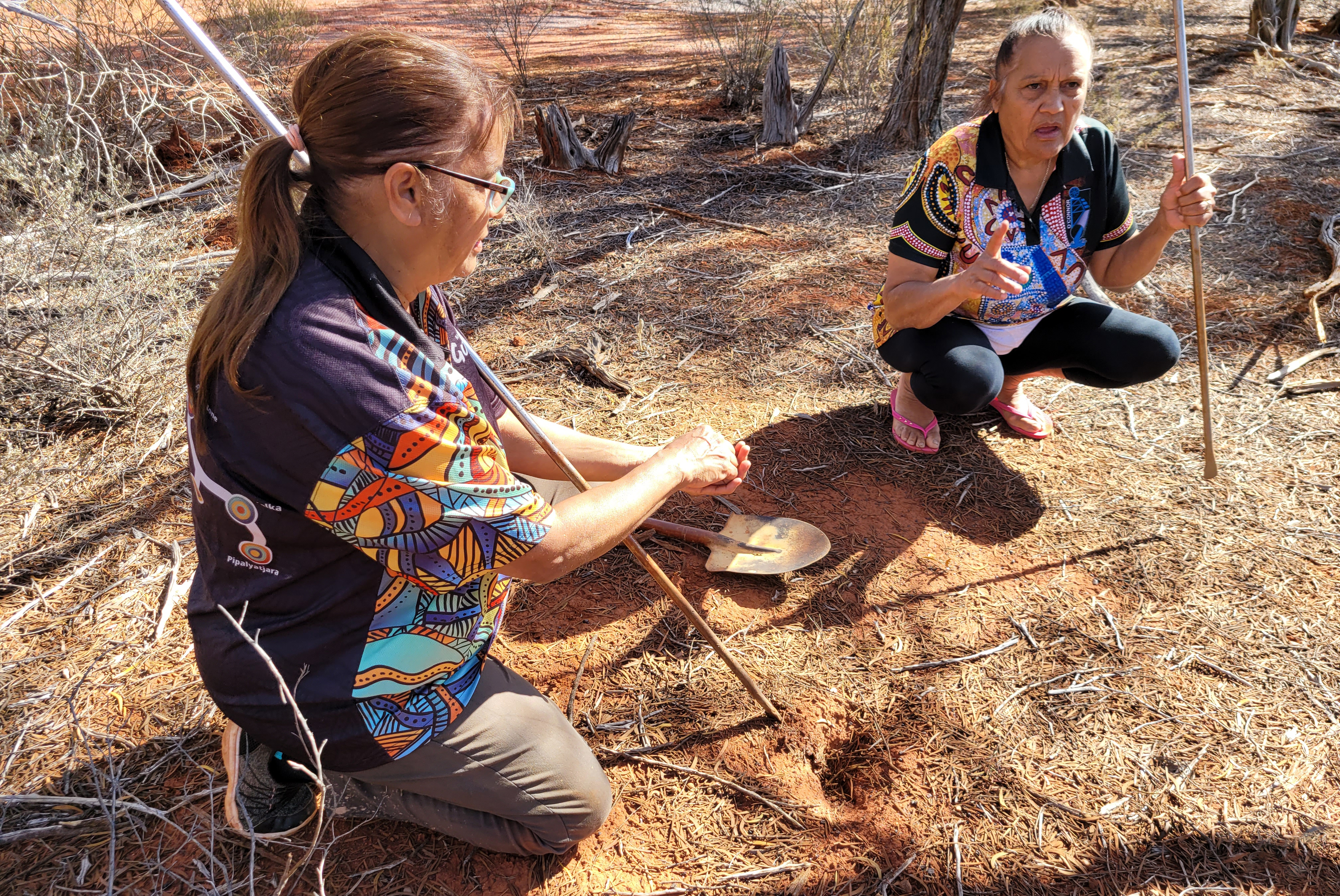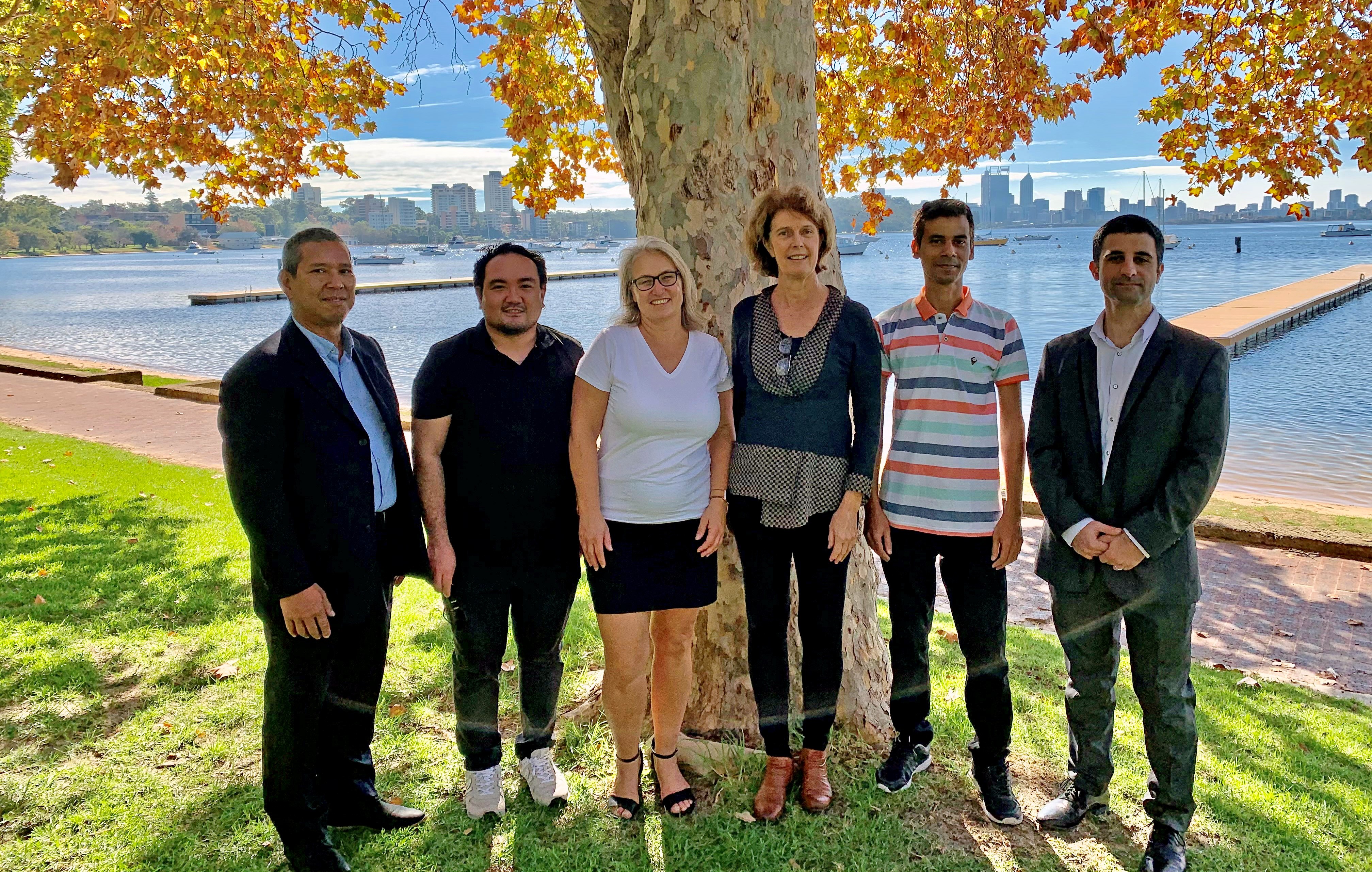Honey derived from bees has been extensively analysed around the world, yet very few studies have been conducted on the unusual insect honey produced by Western Australian honeypot ants.
Sometimes referred to as ‘living pantries’, honeypot ants (Camponotus inflatus) have abdomens swollen with honey to the size of a small marble, which can be regurgitated to feed the colony in times of scarcity.
The Cooperative Research Centre for Honey Bee Products at The University of Western Australia recently collaborated with the Australian Biome to complete the first comprehensive analysis of honeypot ant honey collected 50km east of Kalgoorlie in the Goldfields region of WA.
 Image: Edie Ulrich and her sister Margorie Stubbs collecting honeypot ants in the Goldfields WA. Credit: CRC for Honey Bee Products
Image: Edie Ulrich and her sister Margorie Stubbs collecting honeypot ants in the Goldfields WA. Credit: CRC for Honey Bee Products
The study, published in Molecules, was conducted by School of Allied Health Associate Professor Cornelia Locher and UWA researchers Md Khairul Islam, Ivan Lozada Lawag, Tomislav Sostaric and Professor Lee Yong Lim.
It collated baseline data on the honey’s physicochemical properties and its antioxidant activity and determined its phenolics profile and its major sugars by High Performance Thin Layer Chromatography to compare with honey produced by honeybees.
While in many respects ant honey was found to be similar, it also showed some interesting differences.
Professor Locher said the research team found that ant honey had a higher water content compared to typical honeybee-derived honey.
“Given the arid environment honeypot ants live in, a higher water content it probably beneficial to the colony,” she said.
A noticeable difference was also found in the ant honey’s main sugars – glucose was present in higher quantities than fructose, which is opposite to many honeybee-derived types of honey.
 Image: Honeypot ants collected for the study. Credit: CRC For Honey Bee Products
Image: Honeypot ants collected for the study. Credit: CRC For Honey Bee Products
The study also found evidence of a currently unidentified sugar in the ant honey.
According to the taste panellists, the ant honey was less sweet and slightly sour compared with a honeybee honey sample – despite having a total sugar content of 67g per 100g.
“As an acidic environment is seen as less conducive for microbial growth, the acidity of honey is considered as one factor that contributes to honey’s antibacterial activity,” Professor Locher said.
“Future research should therefore explore the antibacterial activity of ant honey.”
 Image: Australian Biome chairman Terrence Dewar, Ivan Lawag, Associate Professor Connie Locher, CRC for Honey Bee Products CEO Dr Liz Barbour, Md Khairul Islam and Moe Choueib. Credit CRC for Honey Bee Products
Image: Australian Biome chairman Terrence Dewar, Ivan Lawag, Associate Professor Connie Locher, CRC for Honey Bee Products CEO Dr Liz Barbour, Md Khairul Islam and Moe Choueib. Credit CRC for Honey Bee Products
As honeypot ant honey has significant cultural and nutritional importance for local Aboriginal people, the research was conducted in consultation with Kutju woman Edie Ulrich and her son Danny Ulrich from the Tjupan language group.
Ms Ulrich said honeypot ants had been a part of Indigenous peoples’ diets for as long as they could remember.
“Legend has it that mothers who sit and gather the honey ants become so absorbed with digging that they forget to pay attention to their children and surroundings,” she said.
Not only indigenous people value this unusual Australia natural product – honeypot ants have also started to feature in desserts offered by high-end restaurants specialising in native foods.
PhD candidate Mr Islam will present his research into the authentication and quality control of WA honeys at The UWA Institute of Agriculture’s Postgraduate Showcase on Thursday, 23 June 2022.
Media references
Rosanna Candler (Communications Officer, The UWA Institute of Agriculture) +61 08 6488 1650
Associate Professor Cornelia Locher (Deputy Head, Division of Pharmacy, School of Allied Health) +61 08 6488 3199
